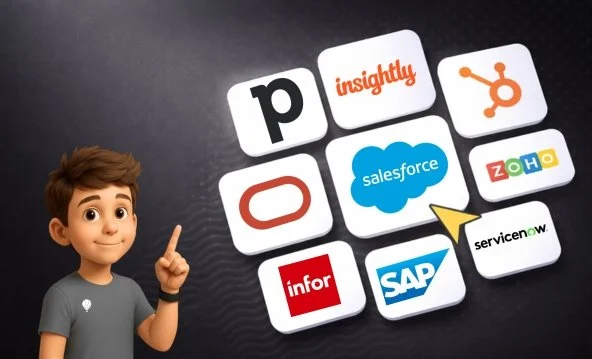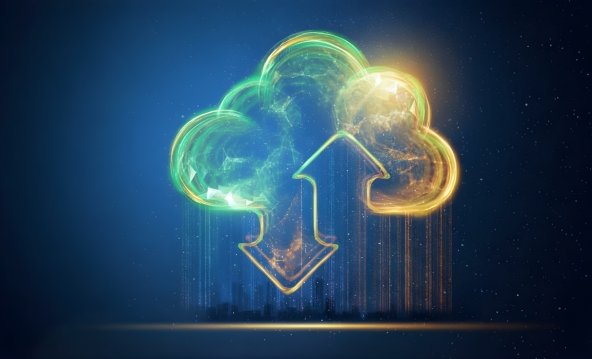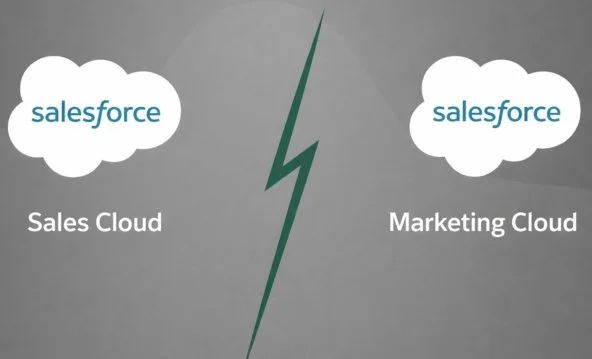Salesforce for B2C Businesses: Drive Personalization, Engagement, and Growth
In today’s convenience-first world, medium and large B2C businesses face increasing pressure to deliver fast, seamless, and personalized experiences at every step of the customer journey. Whether it’s attracting new buyers, providing responsive service, or building long-term loyalty, the expectations are higher than ever, and so is the competition.
This is especially true for industries like retail, fashion, personal care, travel, consumer electronics, and food and beverage, where direct-to-consumer (D2C) models dominate. Yet many brands still rely on disconnected systems that slow them down.
The solution? An all-in-one platform that brings sales, marketing, commerce, and service into one place. In this blog, we’ll explore why integrated systems are critical for B2C success and how leveraging Salesforce for B2C makes it possible.
Why Do B2C Businesses Need a CRM—Is It Necessary?
The short answer: absolutely yes.
To understand why, think about the typical customer journey, from the moment someone sees your ad, browses your product, makes a purchase, reaches out to support, and ideally becomes a loyal customer. That entire experience, from first impression to post-sale service, needs to be smooth and connected.
To deliver that kind of consistent, connected experience, businesses need a single system that unifies marketing, sales, and service data. Rather than juggling disconnected tools, a platform like Salesforce can manage everything from one centralized hub.
Common Challenges B2C Businesses Face
Managing the full customer journey, from discovery to loyalty, is no small feat. As customer expectations continue to evolve, businesses face several challenges that can hinder growth. Here are some of the most pressing ones:
1. Disconnected Tools and Teams
Many B2C businesses use separate tools or platforms for departments like sales, marketing, service, and commerce, resulting in data being stored in isolation and inaccessible to other teams. This disconnect not only hampers collaboration but also creates gaps in the customer experience. For example, valuable customer data collected by the sales team may not be accessible to marketing teams, or may often require extra manual steps to bring everything together.
2. Ineffective Analytics
Numbers don’t lie, but only when they’re organized, accessible, and connected. Many B2C businesses collect data across different touchpoints, but without an advanced analytics system, the information often remains limited. As a result, it becomes difficult to track performance, understand customer behavior, or make confident decisions.
3. Customer Retention
It’s often said: getting customers is easier than keeping them, and that’s true in the B2C space. With so many choices available, today’s customers won’t hesitate to switch to a competitor after a single poor experience. Without a clear retention strategy, personalized engagement, or loyalty programs, it becomes incredibly difficult to keep customers coming back.
4. Low Engagement
Even the most carefully planned campaigns can fall flat if they don’t resonate with the audience.
This is the most common challenge across industries; customers simply don’t engage unless the message speaks directly to their needs, preferences, or current situation. Without personalization and real-time insights into behavior and preferences, businesses risk delivering generic content that fails to capture attention, resulting in minimal return and missed growth opportunities.
5. Limited Personalization
Personalization is everything, and businesses recognize its value. The challenge begins when it's time to scale that personalization. As the customer base expands, staying relevant in every interaction becomes more difficult. Without automation, AI, and real-time insights, delivering consistent and meaningful experiences across thousands of touchpoints becomes nearly impossible.
How Salesforce for B2C Helps Businesses Grow
Known as the world’s #1 CRM, Salesforce offers a powerful suite of solutions designed to help B2C businesses engage customers at every stage from discovery and purchase to post-sale service and long-term retention. Here’s how it makes that possible:
1. Unified Data
All Salesforce products are built on the same platform, with Data Cloud as their foundation. This architecture ensures every interaction, whether through marketing, sales, service, or commerce, remains connected.
For example, data collected by the sales team can instantly be accessed by the marketing team to craft personalized campaigns. This enhances collaboration and delivers a seamless experience to every customer.
Salesforce data cloud | Source: Salesforce
2. Actionable Analytics
Salesforce turns customer data into meaningful insights through advanced analytics and visualization tools like Tableau, Reports & Dashboards, and Data Cloud. From marketing engagement and purchase history to service interactions and browsing behavior, every data point is visualized in real time.
This allows businesses to:
Identify high-value customer segments
Track campaign performance and ROI
Anticipate trends and buying behavior
Make faster, data-backed decisions
Salesforce for B2C ensures that data isn’t just collected, it’s transformed into clear, actionable intelligence that drives growth.
3. Boosting Customer Retention
To increase customer retention, B2C businesses must maintain a connection with their customers long after the first purchase. Salesforce for B2C enables this by supporting post-sale engagement through tools like Service Cloud for customer support and follow-ups, and Marketing Cloud for delivering personalized communication across multiple channels.
What’s more, businesses can also send promotional offers, loyalty rewards, and re-engagement campaigns via email, SMS, push notifications, and more, tailored to each customer’s preferences and behavior.
Want to see how Salesforce is transforming retail businesses? Read our Salesforce for Retail blog.
4. Turn Low Engagement Into Action
To tackle low engagement, businesses need to shift from static campaigns to real-time, personalized interactions. Salesforce Marketing Cloud Personalization helps by delivering one-to-one, real-time experiences across web, mobile, and email channels.
With Einstein AI at the core, Salesforce interprets engagement patterns to identify true interests and intent, then delivers the most relevant message or offer based on real-time context. By combining this with Journey Builder, marketers can automate next-best actions across the customer lifecycle, re-engaging audiences with personalized messaging that feels helpful, not pushy.
5. Scaling Personalization with AI and Automation
Salesforce enables personalization at scale through tools like Marketing Cloud, Einstein AI, and Data Cloud. Together, these solutions analyze real-time customer behavior and automate the delivery of tailored content, product recommendations, and offers across email, mobile, and social channels.
Whether it’s sending a birthday discount or customizing a homepage based on previous purchases, Salesforce helps deliver relevant, timely experiences no matter how large your customer base grows.
Salesforce B2C Commerce: One Platform for Every B2C Need
Salesforce offers a powerful solution tailored specifically for B2C brands: B2C Commerce, part of the broader Commerce Cloud suite. Instead of piecing together multiple tools to manage storefronts, personalization, analytics, and AI, B2C Commerce gives businesses everything in one connected platform.
Designed to create seamless, intelligent, and scalable shopping experiences, it empowers brands to move faster, personalize more deeply, and drive long-term loyalty at every customer touchpoint.
Here’s what makes Salesforce B2C Commerce stand out:
1. Create Branded Digital Storefronts
Salesforce B2C Commerce lets you launch your online store quickly using ready-to-use templates and drag-and-drop tools. You can build a fully branded, feature-rich storefront without starting from scratch, ensuring your customers get a smooth, engaging experience from the first visit.
Salesforce B2C Commerce | Source: Salesforce
2. Get Data-Driven Insights from One Unified Platform
All your customer, sales, and marketing data is connected through Salesforce Data Cloud, giving you real-time, actionable insights. This unified view helps you understand buyer behavior, optimize product offerings, and personalize campaigns across every touchpoint, all from a single source of truth.
3. 24/7 AI Shopping Assistance with Agentforce
Salesforce for B2C takes personalization to the next level with Agentforce. These intelligent AI agents act as round-the-clock shopping assistants that help customers discover products, ask questions, and get AI-powered product recommendations in real time
Curious to know what makes an AI agent so powerful? Read our blog on how Agentforce works.
4. Optimized Performance at Scale
Whether it’s a flash sale or peak season, your digital store is built to handle high traffic with ease. Salesforce B2C Commerce offers enterprise-grade reliability with 99.99% uptime, global scalability, and robust architecture to keep your storefront running smoothly.
Success Story: How YETI Built a Customized Commerce Experience in Just 4.5 Weeks
Global outdoor brand YETI is known for its rugged, adventure-ready drinkware and standout customer experiences. When launching its latest All Day Drinkware campaign, YETI wanted to go beyond standard templates and deliver an immersive, guided shopping journey. And they did just that, with Salesforce Commerce Cloud’s Composable Storefront.
Instead of rebuilding their entire website, YETI adopted a hybrid storefront approach: blending existing templates with headless commerce capabilities. This allowed them to build and launch a fully customized digital experience in just 4.5 weeks.
Tools Used:
Commerce Cloud: Powered the end-to-end digital shopping experience with customizable storefront features
Service Cloud: Unified customer data and enabled faster, more personalized support experiences
Tableau: Provided a single source of truth for sales performance and customer insights across channels
The Results
4.5 Weeks to launch a fully customized web experience
63% YoY Increase in mobile conversion rates due to optimized UX and storytelling
3 to 1 Consolidation of customer service systems, improving response times and cutting costs
With Salesforce, YETI didn’t just launch a campaign; they redefined how their customers interact with the brand online. From real-time personalization and post-purchase support to deep data insights, YETI now delivers a truly connected experience that reflects their values and vision.
Final Thoughts
Competition has grown tougher in every industry. But customers tend to stay with brands that truly understand them—those that listen, respond, and deliver value beyond the first purchase. That’s where Salesforce for B2C shines. It helps businesses connect every part of the customer journey, from discovery to loyalty, in one unified platform.
Looking to deliver that kind of connected experience?
Concretio can help. We’re a certified Salesforce consulting partner helping businesses set up and use Salesforce the right way, faster, smarter, and with real results.
Suggested Read
Salesforce Experience Cloud: A Quick Introduction
Salesforce: A Strategic Choice for Higher Education Institutions
Salesforce Retail Cloud With Modern POS
Salesforce Health Cloud: Features, Benefits for Healthcare Organizations
B2B Guide to Empowering Financial Services Providers with Salesforce
Let’s Talk!

Drop us a note, we’re happy to take the conversation forward






